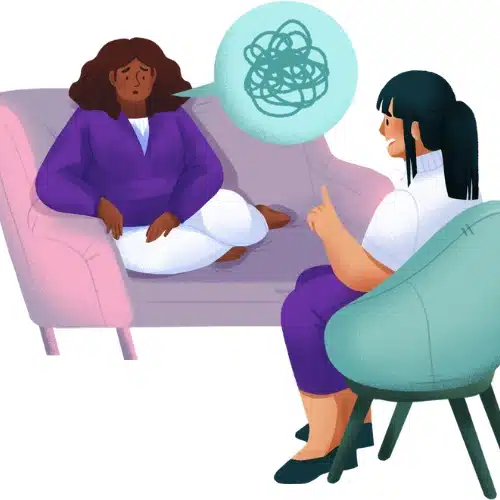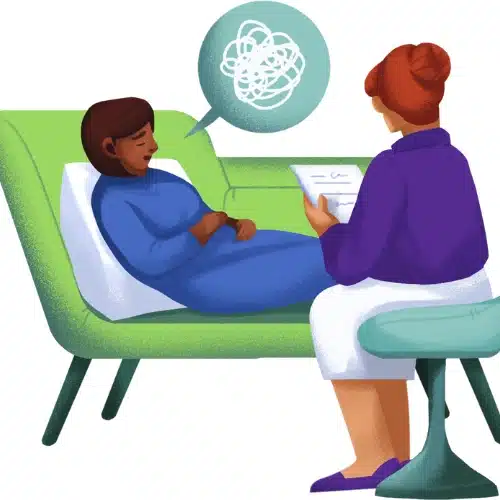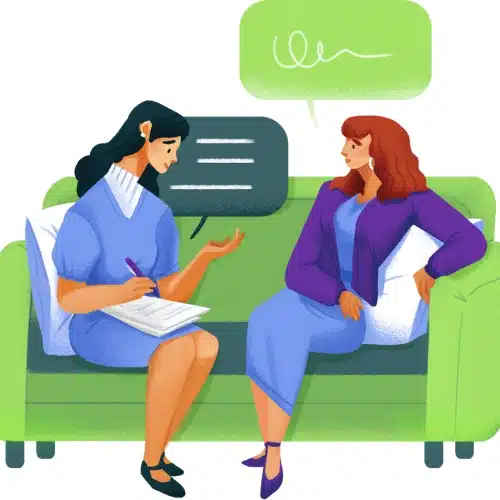Break the Cycle, and Rediscover Peace
Are you struggling with persistent sadness, fatigue, or a lack of motivation? At Hypnotherapist.es, our Depression and Low Mood Therapy provides a compassionate and personalised approach to emotional wellbeing. Whether you’re experiencing mild low mood or more prolonged symptoms of depression, our therapy sessions are designed to uncover the underlying causes and help you feel more like yourself again.
Using a blend of evidence-based techniques such as Hypnotherapy, Rapid Transformational Therapy (RTT), and subconscious-focused approaches, we help you shift unhelpful thought patterns, process suppressed emotions, and build healthier coping strategies.
Our experienced therapists offer a safe, non-judgemental space where you can explore your feelings and take meaningful steps towards recovery and emotional clarity.

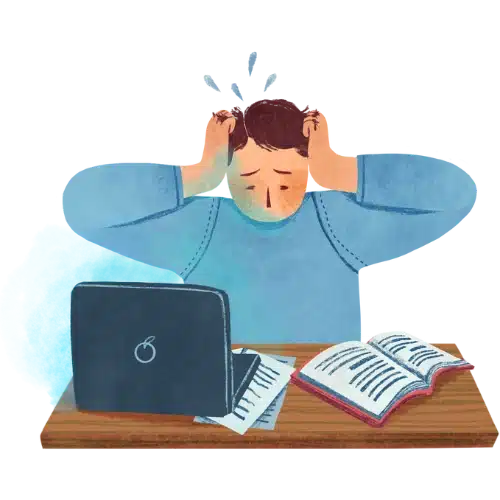

Ready to take the first step towards lasting change?
Contact us today to book your free discovery call or ask any questions, we’re here to help.
HOW CAN DEPRESSION OR LOW MOOD THERAPY HELP ME?
Depression and persistent low mood can affect every area of your life, from your relationships and work performance to your overall wellbeing. Therapy offers a safe and supportive space to explore the underlying causes of your emotional struggles. Using proven subconscious techniques such as hypnotherapy and Rapid Transformational Therapy (RTT), we help you reframe negative thinking patterns, release emotional blocks, and build emotional resilience. Whether you’re dealing with long-term depression or a period of feeling stuck, therapy can support your healing and empower you to move forward with clarity and purpose.
![]() Reframe unhelpful thought patterns and inner dialogue
Reframe unhelpful thought patterns and inner dialogue
![]() Release emotional trauma and subconscious blocks
Release emotional trauma and subconscious blocks
![]() Build coping tools for day-to-day emotional balance
Build coping tools for day-to-day emotional balance
![]() Improve motivation, focus, and self-esteem
Improve motivation, focus, and self-esteem
![]() Rediscover a sense of hope, joy, and purpose
Rediscover a sense of hope, joy, and purpose
BENEFITS OF DEPRESSION AND LOW MOOD THERAPIES?
Engaging in therapy for depression or low mood can offer life-changing benefits. By addressing both conscious thoughts and the deeper, subconscious patterns that fuel emotional distress, therapy empowers lasting transformation. Techniques like hypnotherapy and RTT gently uncover root causes, helping you understand why you feel the way you do, and how to change it. With consistent support, you can learn healthier ways to process emotions, strengthen your inner resilience, and take back control of your life. Therapy isn’t just about feeling better, it’s about living better, with clarity, balance, and emotional strength.
![]() Identify and heal the root causes of low mood
Identify and heal the root causes of low mood
![]() Gain insight into behavioural and emotional patterns
Gain insight into behavioural and emotional patterns
![]() Reduce negative self-talk and inner criticism
Reduce negative self-talk and inner criticism
![]() Improve emotional regulation and mental clarity
Improve emotional regulation and mental clarity
![]() Rebuild self-confidence, motivation, and optimism
Rebuild self-confidence, motivation, and optimism
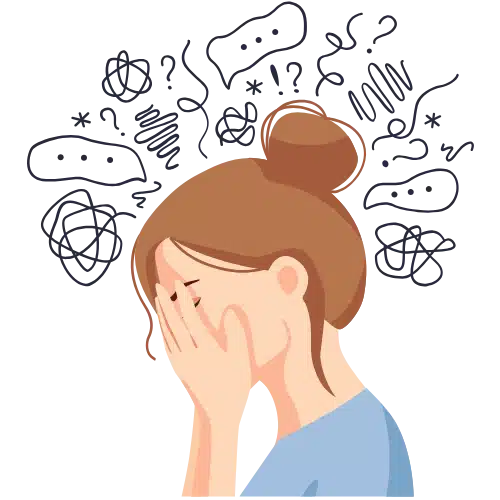

Looking for an Online Hypnotherapist?
Contact us today to book your free discovery call or ask any questions, we’re here to help.

CAN I OVERCOME DEPRESSION WITH THERAPY?
Yes, many people successfully overcome depression with the right therapeutic support. Therapy helps you uncover the emotional and psychological triggers behind your low mood, giving you the tools to shift unhelpful patterns and make space for positive change. Techniques such as hypnotherapy and Rapid Transformational Therapy (RTT) focus on addressing the subconscious beliefs and past experiences that may be contributing to your depression. Over time, with commitment and the right guidance, therapy can help you regain balance, reconnect with your sense of purpose, and build a stronger, more resilient mindset — so you no longer feel controlled by your emotions.
![]() Discover the root causes behind your depression
Discover the root causes behind your depression
![]() Learn to manage and shift negative thought patterns
Learn to manage and shift negative thought patterns
![]() Access deeper emotional healing beyond surface-level symptoms
Access deeper emotional healing beyond surface-level symptoms
![]() Develop coping strategies to handle daily challenges
Develop coping strategies to handle daily challenges
![]() Rebuild motivation, hope, and self-worth
Rebuild motivation, hope, and self-worth
CAN I USE THERAPY RATHER THAN MEDICATION?
For many individuals, therapy can be a powerful and effective alternative to medication when treating depression or low mood. While medication can help stabilise symptoms, therapy focuses on identifying and resolving the underlying causes of emotional distress. Hypnotherapy and techniques like Rapid Transformational Therapy (RTT) work at a deeper subconscious level, helping to reframe negative thought patterns, past experiences, and limiting beliefs. For those seeking a more natural, long-term solution without the side effects often associated with medication, therapy offers a personalised and empowering path to emotional healing and self-awareness. In some cases, therapy may be used alongside medication, but for many, it’s an effective standalone treatment.
![]() Avoid the potential side effects of antidepressant medication
Avoid the potential side effects of antidepressant medication
![]() Address root causes rather than just managing symptoms
Address root causes rather than just managing symptoms
![]() Learn practical coping tools for long-term emotional wellbeing
Learn practical coping tools for long-term emotional wellbeing
![]() Rewire subconscious patterns through hypnotherapy or RTT
Rewire subconscious patterns through hypnotherapy or RTT
![]() Feel empowered by taking an active role in your recovery
Feel empowered by taking an active role in your recovery
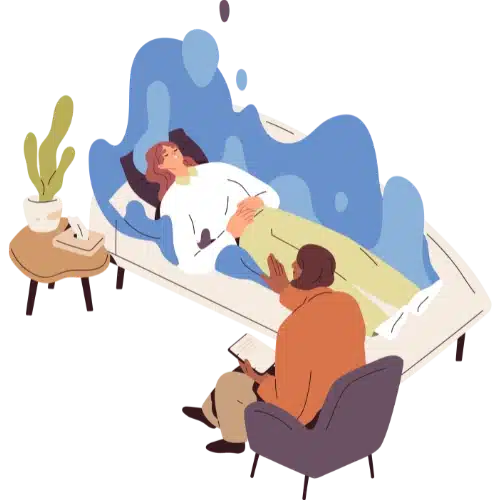
How it Works
We offer availability with highly experienced therapists suited to your needs and book the appointment.
Meet the practitioner and begin the road to self-improvement. Have any concerns? Let us know so we can assist.
Find a Therapist in Spain

PROFESSIONAL DEPRESSION OR LOW MOOD THERAPIES
Before reaching out, we kindly invite you to explore our Depression and Low Mood Therapy FAQs. These offer clear answers to common questions about how our therapy works, what to expect from hypnotherapy, session formats, and pricing. Taking a few moments to review this information helps us respond to your enquiry more efficiently and ensures you feel confident and well-informed before beginning your journey towards emotional wellbeing. Available online or in-person across Spain, including Marbella, Sotogrande, and Gibraltar, our team at Hypnotherapist.es is here to support you with compassion and care.
What is depression?
 Depression is a common but serious mood disorder that affects how you feel, think, and handle daily activities like sleeping, eating, or working. It involves persistent feelings of sadness or loss of interest that last at least two weeks and can interfere with your ability to function. Depression is more than just feeling low, it can affect your energy levels, concentration, and overall wellbeing. While it can be challenging, depression is treatable, and seeking support early can significantly improve your quality of life.
Depression is a common but serious mood disorder that affects how you feel, think, and handle daily activities like sleeping, eating, or working. It involves persistent feelings of sadness or loss of interest that last at least two weeks and can interfere with your ability to function. Depression is more than just feeling low, it can affect your energy levels, concentration, and overall wellbeing. While it can be challenging, depression is treatable, and seeking support early can significantly improve your quality of life.
![]() Persistent low mood or sadness lasting two weeks or more
Persistent low mood or sadness lasting two weeks or more
![]() Loss of interest or pleasure in activities once enjoyed
Loss of interest or pleasure in activities once enjoyed
![]() Changes in appetite or sleep patterns
Changes in appetite or sleep patterns
![]() Difficulty concentrating or making decisions
Difficulty concentrating or making decisions
![]() Feelings of worthlessness or hopelessness
Feelings of worthlessness or hopelessness
What are some of the signs and symptoms of depression?
 Depression symptoms vary but commonly include a persistent low or sad mood, loss of interest in activities, changes in sleep and appetite, low energy, and difficulty concentrating. People may also experience feelings of worthlessness, irritability, anxiety, or thoughts of self-harm. Symptoms must last for at least two weeks to be diagnosed as clinical depression. Recognising these signs early is crucial for seeking help and starting effective treatment.
Depression symptoms vary but commonly include a persistent low or sad mood, loss of interest in activities, changes in sleep and appetite, low energy, and difficulty concentrating. People may also experience feelings of worthlessness, irritability, anxiety, or thoughts of self-harm. Symptoms must last for at least two weeks to be diagnosed as clinical depression. Recognising these signs early is crucial for seeking help and starting effective treatment.
![]() Depressed mood most of the day, nearly every day
Depressed mood most of the day, nearly every day
![]() Reduced pleasure or interest in usual activities
Reduced pleasure or interest in usual activities
![]() Sleep disturbances such as insomnia or oversleeping
Sleep disturbances such as insomnia or oversleeping
![]() Fatigue or loss of energy
Fatigue or loss of energy
![]() Thoughts of death or self-harm
Thoughts of death or self-harm
How are therapy sessions for depression and low mood delivered?
 Therapy sessions for depression and low mood can be delivered either face-to-face or online, depending on your preference and location. Both formats provide a confidential, safe space to explore your feelings and work through challenges with a trained professional. Online sessions offer flexibility and convenience, while in-person sessions may benefit those who prefer direct human interaction. Therapists tailor each session to your unique needs, combining techniques like cognitive behavioural therapy, hypnotherapy, or Rapid Transformational Therapy to help you manage symptoms and build resilience.
Therapy sessions for depression and low mood can be delivered either face-to-face or online, depending on your preference and location. Both formats provide a confidential, safe space to explore your feelings and work through challenges with a trained professional. Online sessions offer flexibility and convenience, while in-person sessions may benefit those who prefer direct human interaction. Therapists tailor each session to your unique needs, combining techniques like cognitive behavioural therapy, hypnotherapy, or Rapid Transformational Therapy to help you manage symptoms and build resilience.
![]() Flexible options: in-person or online sessions
Flexible options: in-person or online sessions
![]() Confidential and supportive environment
Confidential and supportive environment
![]() Personalised therapy plans to suit individual needs
Personalised therapy plans to suit individual needs
![]() Sessions typically last 50-60 minutes
Sessions typically last 50-60 minutes
![]() Scheduling to fit your lifestyle
Scheduling to fit your lifestyle
How many therapy sessions will I need?
 The number of therapy sessions needed for depression or low mood varies depending on the individual’s situation, severity of symptoms, and therapy type. Some clients experience significant improvement within a few sessions, while others may require ongoing support over several months. Your therapist will regularly review your progress and adjust the treatment plan accordingly. The goal is to empower you with coping tools and emotional insight to sustain wellbeing beyond therapy.
The number of therapy sessions needed for depression or low mood varies depending on the individual’s situation, severity of symptoms, and therapy type. Some clients experience significant improvement within a few sessions, while others may require ongoing support over several months. Your therapist will regularly review your progress and adjust the treatment plan accordingly. The goal is to empower you with coping tools and emotional insight to sustain wellbeing beyond therapy.
![]() Treatment length varies from short-term (6-12 sessions) to longer-term support
Treatment length varies from short-term (6-12 sessions) to longer-term support
![]() Progress monitored regularly with your therapist
Progress monitored regularly with your therapist
![]() Sessions tailored to your goals and response to therapy
Sessions tailored to your goals and response to therapy
![]() Flexibility to pause or extend therapy as needed
Flexibility to pause or extend therapy as needed
![]() Focus on sustainable mental health improvement
Focus on sustainable mental health improvement
What should I expect during my first therapy session?
 Your first therapy session is designed to help you feel comfortable and understood. You’ll discuss your current feelings, history, and what you hope to achieve through therapy. The therapist will explain their approach, confidentiality, and answer any questions you may have. This session establishes a foundation for trust and sets personalised goals for your therapy journey. It’s normal to feel nervous, but the therapist’s role is to provide a safe, non-judgmental space for your healing.
Your first therapy session is designed to help you feel comfortable and understood. You’ll discuss your current feelings, history, and what you hope to achieve through therapy. The therapist will explain their approach, confidentiality, and answer any questions you may have. This session establishes a foundation for trust and sets personalised goals for your therapy journey. It’s normal to feel nervous, but the therapist’s role is to provide a safe, non-judgmental space for your healing.
![]() Open discussion about your mood, thoughts, and concerns
Open discussion about your mood, thoughts, and concerns
![]() Explanation of therapy methods and confidentiality
Explanation of therapy methods and confidentiality
![]() Setting clear goals and expectations
Setting clear goals and expectations
![]() Opportunity to ask questions and express worries
Opportunity to ask questions and express worries
![]() Emphasis on creating a trusting therapeutic relationship
Emphasis on creating a trusting therapeutic relationship
Are therapy sessions confidential?
 Yes, all therapy sessions are confidential. Your privacy is a top priority, and therapists adhere to professional ethical guidelines to protect your information. Details shared during sessions are kept secure and will not be disclosed without your consent, except in exceptional cases where there is a risk of harm to yourself or others. This confidentiality allows you to speak openly and honestly, fostering trust and effective therapy.
Yes, all therapy sessions are confidential. Your privacy is a top priority, and therapists adhere to professional ethical guidelines to protect your information. Details shared during sessions are kept secure and will not be disclosed without your consent, except in exceptional cases where there is a risk of harm to yourself or others. This confidentiality allows you to speak openly and honestly, fostering trust and effective therapy.
![]() Strict adherence to confidentiality standards
Strict adherence to confidentiality standards
![]() Information shared only with your consent
Information shared only with your consent
![]() Exceptions apply only if safety concerns arise
Exceptions apply only if safety concerns arise
![]() Secure record-keeping practices
Secure record-keeping practices
![]() Ensures a safe space for honest communication
Ensures a safe space for honest communication
Can therapy help with depression during menopause?
 Yes, therapy can be highly effective for managing depression related to menopause. Hormonal changes during menopause can affect mood, energy, and sleep, often triggering or worsening depressive symptoms. Therapeutic approaches such as cognitive behavioural therapy (CBT), hypnotherapy, and mindfulness help address emotional fluctuations, reduce anxiety, and improve coping strategies. Therapy also provides a supportive space to explore the psychological impact of menopause on self-esteem and identity, enabling women to navigate this transition with greater resilience and emotional balance.
Yes, therapy can be highly effective for managing depression related to menopause. Hormonal changes during menopause can affect mood, energy, and sleep, often triggering or worsening depressive symptoms. Therapeutic approaches such as cognitive behavioural therapy (CBT), hypnotherapy, and mindfulness help address emotional fluctuations, reduce anxiety, and improve coping strategies. Therapy also provides a supportive space to explore the psychological impact of menopause on self-esteem and identity, enabling women to navigate this transition with greater resilience and emotional balance.
![]() Tailored approaches for hormonal mood changes
Tailored approaches for hormonal mood changes
![]() Techniques to manage anxiety and sleep disturbances
Techniques to manage anxiety and sleep disturbances
![]() Emotional support through life transitions
Emotional support through life transitions
![]() Improves self-esteem and coping skills
Improves self-esteem and coping skills
![]() Available as online or face-to-face sessions
Available as online or face-to-face sessions
How does therapy support adults with depression?
 Therapy for adults with depression focuses on identifying the root causes of low mood, negative thinking patterns, and unhelpful behaviours. Through evidence-based techniques such as CBT and hypnotherapy, adults learn to challenge and change negative beliefs, build emotional resilience, and develop healthier coping mechanisms. Therapy offers a confidential, supportive environment to explore personal and professional stressors, relationship difficulties, and lifestyle factors affecting mental health. The goal is to empower adults to regain control over their mood and improve overall quality of life.
Therapy for adults with depression focuses on identifying the root causes of low mood, negative thinking patterns, and unhelpful behaviours. Through evidence-based techniques such as CBT and hypnotherapy, adults learn to challenge and change negative beliefs, build emotional resilience, and develop healthier coping mechanisms. Therapy offers a confidential, supportive environment to explore personal and professional stressors, relationship difficulties, and lifestyle factors affecting mental health. The goal is to empower adults to regain control over their mood and improve overall quality of life.
![]() Identifies and addresses root causes of depression
Identifies and addresses root causes of depression
![]() Develops practical coping and problem-solving skills
Develops practical coping and problem-solving skills
![]() Focuses on personal, social, and work-related stressors
Focuses on personal, social, and work-related stressors
![]() Builds resilience and emotional awareness
Builds resilience and emotional awareness
![]() Supports sustainable lifestyle changes
Supports sustainable lifestyle changes
Is therapy suitable for children experiencing low mood?
 Yes, therapy can be beneficial for children experiencing low mood or early signs of depression. Therapists use child-friendly techniques, including play therapy, art therapy, and age-appropriate cognitive behavioural strategies to help children express their feelings and understand their emotions. Early intervention supports children in developing healthy emotional regulation and coping skills, reducing the risk of long-term mental health issues. Parents and caregivers are often involved in the therapeutic process to provide a supportive environment at home and school.
Yes, therapy can be beneficial for children experiencing low mood or early signs of depression. Therapists use child-friendly techniques, including play therapy, art therapy, and age-appropriate cognitive behavioural strategies to help children express their feelings and understand their emotions. Early intervention supports children in developing healthy emotional regulation and coping skills, reducing the risk of long-term mental health issues. Parents and caregivers are often involved in the therapeutic process to provide a supportive environment at home and school.
![]() Child-centred therapy approaches (play, art, CBT)
Child-centred therapy approaches (play, art, CBT)
![]() Helps children express and understand emotions
Helps children express and understand emotions
![]() Early intervention to prevent long-term issues
Early intervention to prevent long-term issues
![]() Parental involvement to support progress
Parental involvement to support progress
![]() Focus on emotional regulation and coping
Focus on emotional regulation and coping
Can teenagers benefit from therapy for low mood and depression?
 Teenagers can greatly benefit from therapy designed to address the unique challenges of adolescence, such as identity formation, peer pressure, and academic stress. Therapy offers a confidential, judgement-free space to explore feelings of sadness, anxiety, and low self-worth. Techniques like CBT, hypnotherapy, and mindfulness help teens develop positive thinking patterns, improve self-esteem, and manage stress. Therapy also assists in building resilience during a vulnerable developmental period, supporting healthier decision-making and emotional wellbeing.
Teenagers can greatly benefit from therapy designed to address the unique challenges of adolescence, such as identity formation, peer pressure, and academic stress. Therapy offers a confidential, judgement-free space to explore feelings of sadness, anxiety, and low self-worth. Techniques like CBT, hypnotherapy, and mindfulness help teens develop positive thinking patterns, improve self-esteem, and manage stress. Therapy also assists in building resilience during a vulnerable developmental period, supporting healthier decision-making and emotional wellbeing.
![]() Addresses adolescent-specific stressors
Addresses adolescent-specific stressors
![]() Builds self-esteem and positive thinking
Builds self-esteem and positive thinking
![]() Teaches stress management and coping skills
Teaches stress management and coping skills
![]() Confidential and supportive environment
Confidential and supportive environment
![]() Encourages healthy emotional development
Encourages healthy emotional development
How does therapy help with general low mood?
 Therapy for general low mood aims to identify and modify negative thought patterns, enhance motivation, and improve emotional wellbeing. Whether triggered by life stress, relationship issues, or other factors, therapy provides tools to regain energy and interest in daily activities. Techniques such as CBT and hypnotherapy encourage positive behaviour changes and self-care routines. The supportive therapeutic relationship helps you gain insight into your feelings and develop practical strategies to lift your mood and increase overall life satisfaction.
Therapy for general low mood aims to identify and modify negative thought patterns, enhance motivation, and improve emotional wellbeing. Whether triggered by life stress, relationship issues, or other factors, therapy provides tools to regain energy and interest in daily activities. Techniques such as CBT and hypnotherapy encourage positive behaviour changes and self-care routines. The supportive therapeutic relationship helps you gain insight into your feelings and develop practical strategies to lift your mood and increase overall life satisfaction.
![]() Identifies triggers and thought patterns
Identifies triggers and thought patterns
![]() Encourages positive behavioural changes
Encourages positive behavioural changes
![]() Builds motivation and energy
Builds motivation and energy
![]() Develops self-care and coping strategies
Develops self-care and coping strategies
![]() Provides emotional support and insight
Provides emotional support and insight
What styles of therapy do you offer for depression and low mood?
 We offer a range of evidence-based and modern therapeutic approaches tailored to meet the individual needs of each client. Our experienced practitioners specialise in therapies that go beyond talk therapy, including Hypnotherapy, Rapid Transformational Therapy (RTT), Cognitive Behavioural Therapy (CBT) techniques, and subconscious belief-change methods such as Belief Coding®. These therapies aim to address the root cause of depression, not just the symptoms, helping you reframe unhelpful thoughts and release emotional blocks that may be holding you back.
We offer a range of evidence-based and modern therapeutic approaches tailored to meet the individual needs of each client. Our experienced practitioners specialise in therapies that go beyond talk therapy, including Hypnotherapy, Rapid Transformational Therapy (RTT), Cognitive Behavioural Therapy (CBT) techniques, and subconscious belief-change methods such as Belief Coding®. These therapies aim to address the root cause of depression, not just the symptoms, helping you reframe unhelpful thoughts and release emotional blocks that may be holding you back.
![]() Hypnotherapy to access and reprogram limiting beliefs
Hypnotherapy to access and reprogram limiting beliefs
![]() Rapid Transformational Therapy (RTT) for fast, deep change
Rapid Transformational Therapy (RTT) for fast, deep change
![]() Belief Coding to heal emotional triggers at the subconscious level
Belief Coding to heal emotional triggers at the subconscious level
![]() Mindset and subconscious coaching
Mindset and subconscious coaching
![]() Integrative, client-centred support combining different techniques
Integrative, client-centred support combining different techniques
Where do you offer depression therapy services?
 We offer therapy for depression and low mood both in-person and online, making our services accessible across Spain and beyond. In-person sessions are available in key locations including Marbella, Sotogrande, and Gibraltar, where clients can meet in a safe, private environment. For convenience, flexibility, and wider reach, many clients choose our secure online sessions via Zoom or similar platforms. Whether you prefer face-to-face support or online therapy from the comfort of your home, our qualified therapists are here to support you every step of the way.
We offer therapy for depression and low mood both in-person and online, making our services accessible across Spain and beyond. In-person sessions are available in key locations including Marbella, Sotogrande, and Gibraltar, where clients can meet in a safe, private environment. For convenience, flexibility, and wider reach, many clients choose our secure online sessions via Zoom or similar platforms. Whether you prefer face-to-face support or online therapy from the comfort of your home, our qualified therapists are here to support you every step of the way.
![]() In-person sessions in Marbella, Sotogrande & Gibraltar
In-person sessions in Marbella, Sotogrande & Gibraltar
![]() Online sessions available across Spain and internationally
Online sessions available across Spain and internationally
![]() Flexible scheduling to suit busy lifestyles
Flexible scheduling to suit busy lifestyles
![]() Private and confidential therapy environments
Private and confidential therapy environments
![]() Bilingual therapists available upon request
Bilingual therapists available upon request
